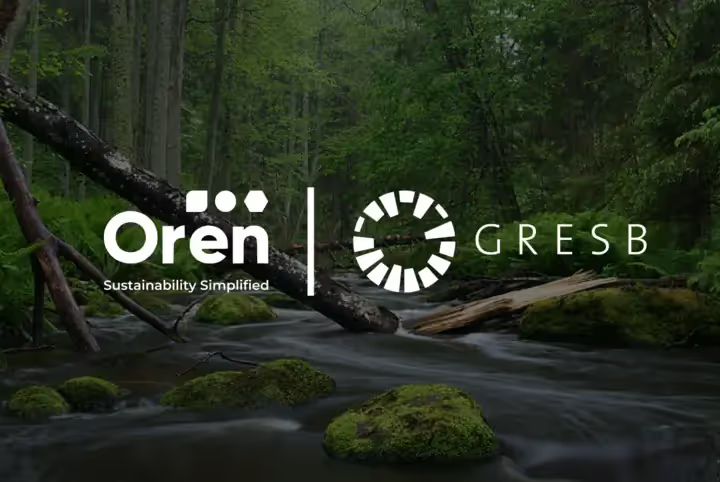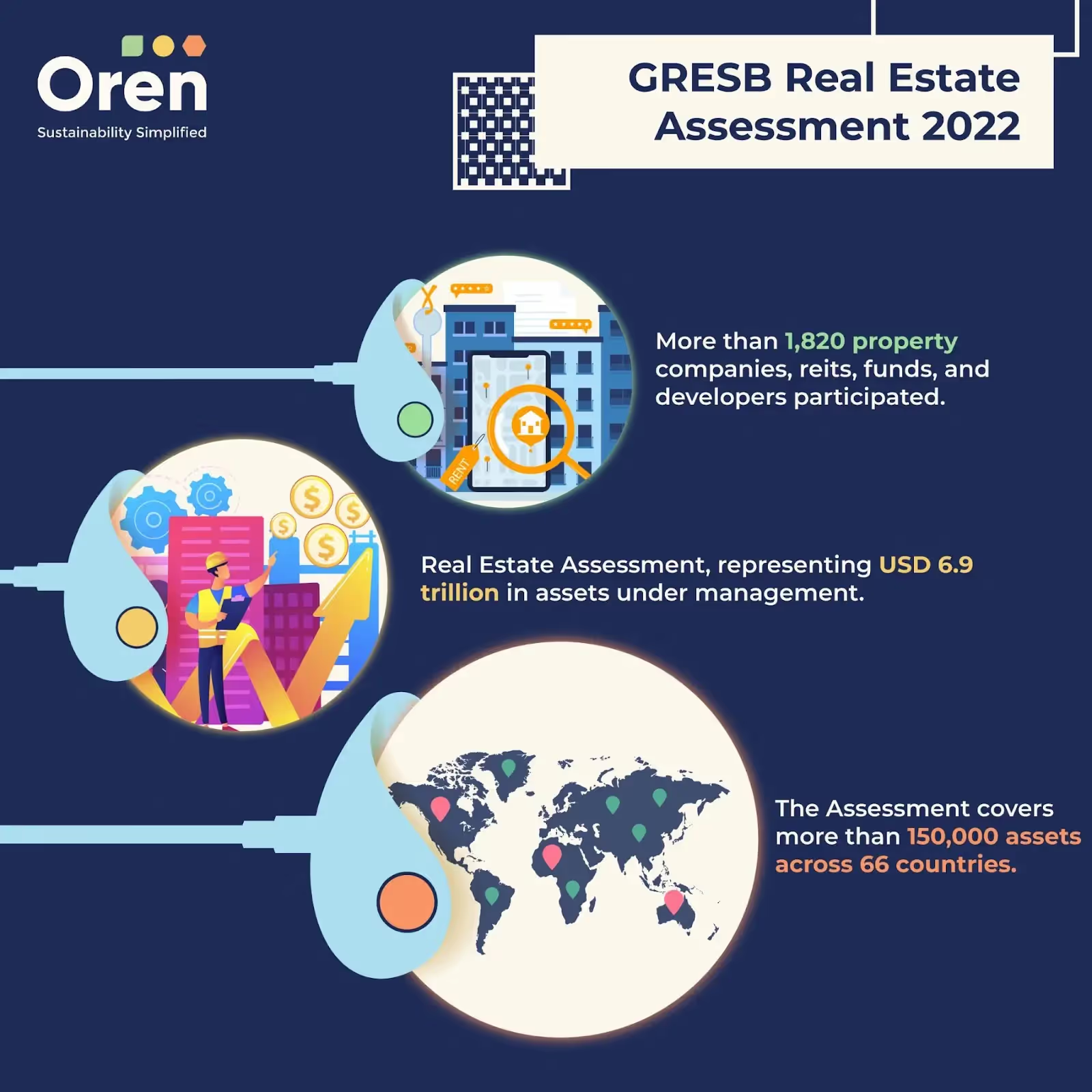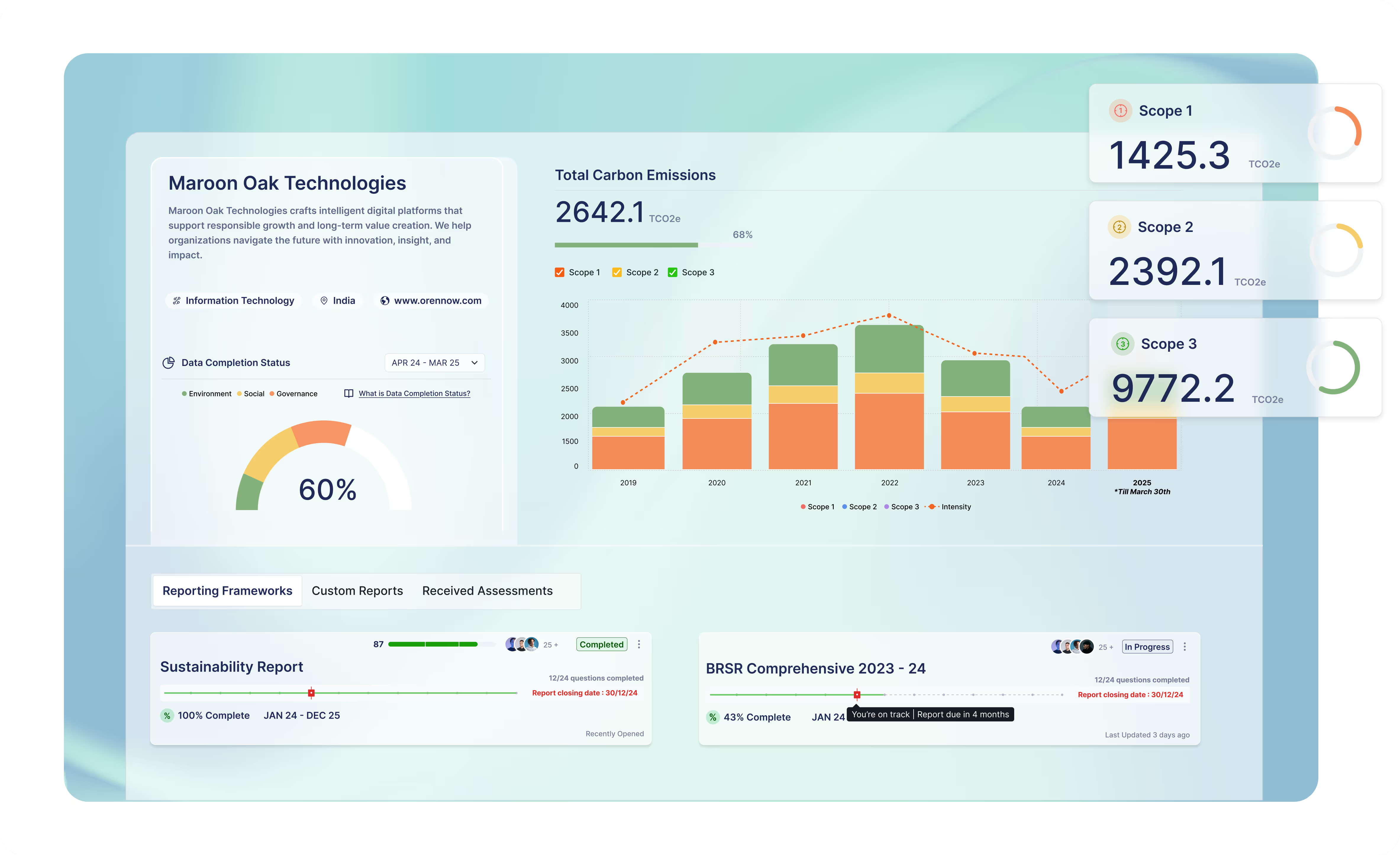Understanding GRESB: Why It Matters for Real Estate Investments

Climate Change - An Overview
As individual and community-level activities continue to have an adverse impact on the environment, climate change remains one of the worst threats to the environment ever. Increasing temperatures, extreme weather conditions, and depleting natural resources are some severe consequences that the entire world is facing. Even the quality of the air we breathe is deteriorating, posing a very high risk to human health.
The increasing trend of the earth's temperature is alarming. Below are a few stats:
- The Earth's temperature has risen by an average of 0.14 Fahrenheit (0.08 Celsius) per decade since 1880, or about 2- F in total.
- 2022 was the sixth-warmest year on record based on NOAA's temperature data.
- 2022 was the sixth-warmest year on record based on NOAA's temperature data.
- The 10 warmest years in the historical record have all occurred since 2010.
Climate change is causing tremendous damage to humanity. To reduce the climate change impact, sustainability is the key.
Importance of sustainability in real estate investments
Real estate is an ever-developing industry that causes direct and indirect impacts on the environment and society. Sustainability is becoming an increasingly important consideration in real estate investments.
1. Climate Change
The real estate industry has a major role in disturbing the ecological balance with deforestation, high GHG emissions, and resource depletion being some of the major causes. A few years ago, climate change seemed like a remote threat but is now a very perceptible immediate risk. The impact is visible more clearly than ever - storms, fluctuating and never seen before temperatures, cyclones, floods, and whatnot! Sustainability measures in real estate can help mitigate climate change risks and other sustainability issues. It can cut down the overall negative impact on the environment and help with an improved approach to a more sustainable economy.
2. Attractive to Potential Buyers
Amidst the increased awareness of the environment, buyers are inclined to invest in eco-friendly buildings and projects. Also, structures created using environment-friendly processes and efficient usage of resources can help in environmental sustainability. For example, solar-powered & energy-efficient structures can help curb the wastage of natural resources, and also reduce operational costs in the long run.
3. Social Responsibility
The real estate industry has a major role in disturbing the ecological balance with deforestation, high GHG emissions, and resource depletion being some of the major causes. A few years ago, climate change seemed like a remote threat but is now a very perceptible immediate risk. The impact is visible more clearly than ever - storms, fluctuating and never seen before temperatures, cyclones, floods, and whatnot! Sustainability measures in real estate can help mitigate climate change risks and other sustainability issues. It can cut down the overall negative impact on the environment and help with an improved approach to a more sustainable economy.
4. Economic Benefits
Sustainable real estate investments can generate financial returns through reduced operating costs, increased property values, and improved tenant satisfaction. They also help in generating economic opportunities for a significant section of society.
To help track and improve sustainability performance, GRESB is an impactful framework.

What is GRESB?
GRESB (Global Real Estate Sustainability Benchmark) is an organization that assesses ESG performance data and provides benchmarks for real estate portfolios and infrastructure businesses. This enables them to compare their performance against peers and take improvement measures. It also helps investors make informed decisions to make sustainable investments.
Globally, stakeholders are eyeing ESG data to evaluate businesses based on how they look at sustainability - environment, social responsibility, and governance. GRESB provides a standardized framework to analyze and evaluate ESG data for the real estate sector - property developers, funds, and REITs (Real estate investment trusts).
The organization launched in 2009, with an initial focus on sustainability in the real estate sector. However, in recent years, GRESB has expanded its focus to include infrastructure investments, such as renewable energy and public utilities, and infrastructure funds, focusing on sectors like transportation, energy, water, telecommunications, and social infrastructure. The name GRESB is originally an acronym, as the organization was focused on the real estate industry.
GRESB Assessments
GRESB assessments are a framework designed to evaluate ESG performance across real estate companies and funds globally. The result of the GRESB assessments forms the basis of creating benchmarks that help the participating organizations to have an insight into their goals and achievements in the three aspects of sustainability environment, social, and governance. It also provides investors, asset, and fund managers with the ability to make informed investments in the companies that score high in their sustainability performance. GRESB assessments are based on a set of survey questions that cover a range of sustainability-related aspects, including energy efficiency, water management, waste management, stakeholder engagement, environment friendliness, policies, and governance.
The result of the GRESB assessment is a benchmark report that helps the participating companies to compare themselves to their peers in terms of sustainability performance, identify the improvement areas, and take necessary actions. It also helps them engage with investors and attract capital and investment opportunities. Investors can make smart investment decisions and strategies to drive a positive impact on sustainability across the industry.
The assessment is based on an annual survey released to real estate companies and funds. Participating companies complete the survey by filling out information about their sustainability practices and policies. The assessment survey covers everything from energy consumption to diversity & inclusion practices and standards of governance. This accounts for eco-friendliness towards the environment and following the right practices towards a balanced society and inclusive work culture.
Types of GRESB Assessments
GRESB assessments focus on environmental, social, and governance (ESG) issues and are used by investors and asset managers to evaluate the sustainability performance of real estate and infrastructure assets. The assessments are conducted annually, and the results are used to benchmark performance, identify areas for improvement, and demonstrate leadership in sustainability.
1. GRESB Real Estate Assessment
The GRESB Real Estate Assessment is designed for real estate companies, real estate investment trusts (REITs), funds, and developers. This assessment evaluates the sustainability performance of real estate companies and funds based on ESG metrics - energy efficiency, GHG emissions, water usage, waste management, social responsibility, and corporate governance.
2. GRESB Infrastructure Asset Assessment
The GRESB Infrastructure Asset Assessment is a benchmarking framework designed to evaluate the sustainability performance of infrastructure assets around the world. Infrastructure assets are physical structures and facilities that provide essential services to support economic, social, and environmental development.
Participating sectors:
- Data Infrastructure
- Energy & Water Resources
- Environmental Services
- Network Utilities
- Power generation (excluding renewables)
- Renewable Power
- Social Infrastructure Transport
The Infrastructure Asset Assessment provides a basis for transparent reporting and peer benchmarking of ESG management and performance of infrastructure assets around the world. It is a way to identify the ESG sustainability of the infrastructure assets how well they are planned, designed, constructed, maintained, and if they ensure the social, financial, and environmental balance is maintained over the entire infrastructure life cycle. The associated governance aspects like employee and customer satisfaction, inclusivity and diversion, and usage of fair policies are also evaluated in the GRESB infrastructure asset assessment.
3. GRESB Infrastructure Fund Assessment
The GRESB Infrastructure Fund Assessment is a benchmarking framework designed to evaluate the sustainability performance of infrastructure funds around the world. Infrastructure Funds are investment schemes that invest primarily in infrastructure assets, including transportation, energy, water, telecommunications, and social infrastructure.
Participating funds:
- Sector-focused funds with investments in toll roads
- Geographic-focused funds with investments in a specific region
- Segregated accounts that are globally diversified offering exposure to several sectors
The Infrastructure Fund Assessment provides a basis for transparent reporting and peer benchmarking of ESG management and performance of infrastructure funds around the world. For a sustainable fund, the focus should not just be on the financial gain but also the social and environmental impact it may have caused through its duration. If the assets the fund invests in are sustainable and align with environmental well-being, protect the natural ecosystem, are inclusive for the employees, increase employment opportunities, don't violate human rights, etc. are some aspects evaluated in GRESB infrastructure fund assessment.
GRESB Assessment Components
- Management: This component focuses on leadership, strategy, policies, risk management, and stakeholder engagement of the entity. All these aspects are drawn from information at the organizational level.
- Performance: This component measures the ESG performance of the entity at the asset level covered by these metrics. It covers performance indicator aspects like output & Impact, health & safety, energy consumption, GHG emissions, water consumption, waste management, biodiversity & habitat, and chemical hazards.
- Development: Recognising that buildings and infrastructure are not static, this component pertains to the design, construction, and renovation of buildings and how ESG is addressed through these activities.
How is a GRESB Assessment Done?
GRESB assessment involves the submission of data and information by real estate companies and funds on their environmental, social, and governance (ESG) performance. The reporting process typically involves the following steps :
- Registration: GRESB requires real estate companies and funds to register to participate in the GRESB assessment.
- Survey completion: Participants complete a detailed survey that covers a range of ESG and related aspects. The survey includes both quantitative and qualitative questions, and participants must provide evidence to support their responses. They are expected to be as precise and truthful with their inputs to get the maximum benefit of participation.
- Validation: GRESB has a robust data validation process which is a three-layer data quality control process. It validates data submitted by participants to ensure accuracy and consistency.
- Scoring: GRESB assigns scores to participants based on their performance across various ESG indicators. Scores are benchmarked against peers in the same region and sector. The scoring happens through a third-party technology platform to analyze data and no manual intervention is done.
- Peer Benchmarking: The participants receive the GRESB benchmark report and they are assigned to a relevant peer group. The report enables detailed peer group comparisons and highlights industry best practices.

GRESB Scoring System
GRESB scores are based on a combination of data quality, performance, and benchmarking. The assessment is scored on a scale of 0 to 100, with higher scores indicating better sustainability performance. The final score is then used to benchmark the sustainability performance of a real estate portfolio against its peers.
GRESB scores are important because they provide investors and stakeholders with a standardized way to compare the sustainability performance of different real estate portfolios.
Some of the top performers of 2022 are listed below :
- Embassy, India's first listed REIT and the largest office REIT in Asia by area has been awarded a 5-star rating by GRESB, the leading global ESG standard for real estate and infrastructure investments, for its entire 42.8 msf operational and development portfolio.
- DLF was awarded a 5-star rating for GRESB and Overall Regional Sector leader.
- CapitaLand Investment Limited (CLI) and its real estate investment trusts (REITs) and business trusts have received recognition for their sustainability achievements in the 2022 GRESB Real Estate Assessment. CLI and CapitaLand Integrated Commercial Trust (CICT) both maintained the highest 5-star rating.
- Godrej Properties has participated in the benchmark assessment since 2013 and achieved its highest score of 95 points this year retaining its leadership position with the highest GRESB score amongst listed residential developers.
- Committed to building a vibrant, inclusive, and sustainable space, Brookfield India Real Estate Trust (BIRET) has been awarded a 5-star rating for its environmental, social, and governance performance from GRESB.
How does GRESB benefit the Real Estate Sector?
GRESB assessments offer a wide variety of benefits to real estate companies, funds, and investors. Not only does it help promote sustainability all across the industry, but it also drives companies to be competitive and do better for the environment and themselves, by adopting new and efficient practices.
1. Competitive advantage in the market
The GRESB assessment provides benchmarks for measuring global sustainability performance across the real estate sector. Companies and funds can compare their performance against peers and identify areas for improvement.
2. Access to capital and investment opportunities
Today, investors are environmentally conscious and are driven toward businesses performing high in sustainability. GRESB gives opportunities to companies to approach investors and attract them with their GRESB scores. GRESB assessments also help investors and asset managers to make informed investment decisions based on ESG performance.
3. Improved sustainability performance
GRESB helps companies have an insight into their sustainability performance. Companies can have a better understanding of what they had planned and what they have achieved, thereby encouraging them to take corrective measures.
4. Risk management
GRESB assessments help real estate companies and funds identify environmental, social, and governance risks and opportunities in their portfolios. By measuring and reporting on ESG performance, companies can manage these risks and improve their resilience to climate change, global warming, social issues, and other sustainability challenges.
5. Enhancing brand value
Higher GRESB scores can contribute to enhancing the company's brand value and reputation. It also helps attract other stakeholders like customers, partners, and business opportunities.
6. Innovation
GRESB assessments encourage real estate companies and funds to adopt innovative technologies and efficient sustainability practices. By promoting best practices and highlighting emerging trends, GRESB can help drive innovation and continuous improvement in the industry.
7. Strive for a better environment
This is the biggest advantage of GRESB. All the participants in GRESB assessments strive to achieve higher GRESB scores. This ensures companies make their efforts count and are highly conscious of the environment.
Sustainable real estate investments are essential for creating a more sustainable and stable environment and meeting the needs of future generations. Sustainability-driven investors can bring in major change by creating a relevant positive impact on the environment.
Conclusion
In conclusion, climate change demands urgent action, particularly from the real estate sector, which significantly impacts the environment. Embracing sustainable practices not only mitigates climate risks but also adds economic value and attracts eco-conscious buyers.
With tools like GRESB and support from Oren, an ESG software and service company, real estate firms can effectively track and enhance their sustainability efforts. By leveraging Oren’s expertise, organizations can achieve higher ESG performance and contribute meaningfully to a more sustainable and resilient future.
Latest Blog Posts
Dive into our blog for insights on making your organization more sustainable.
Sustainability Simplified
Wherever you are in your sustainability journey, we help you advance with confidence.
Schedule a Call



.avif)

